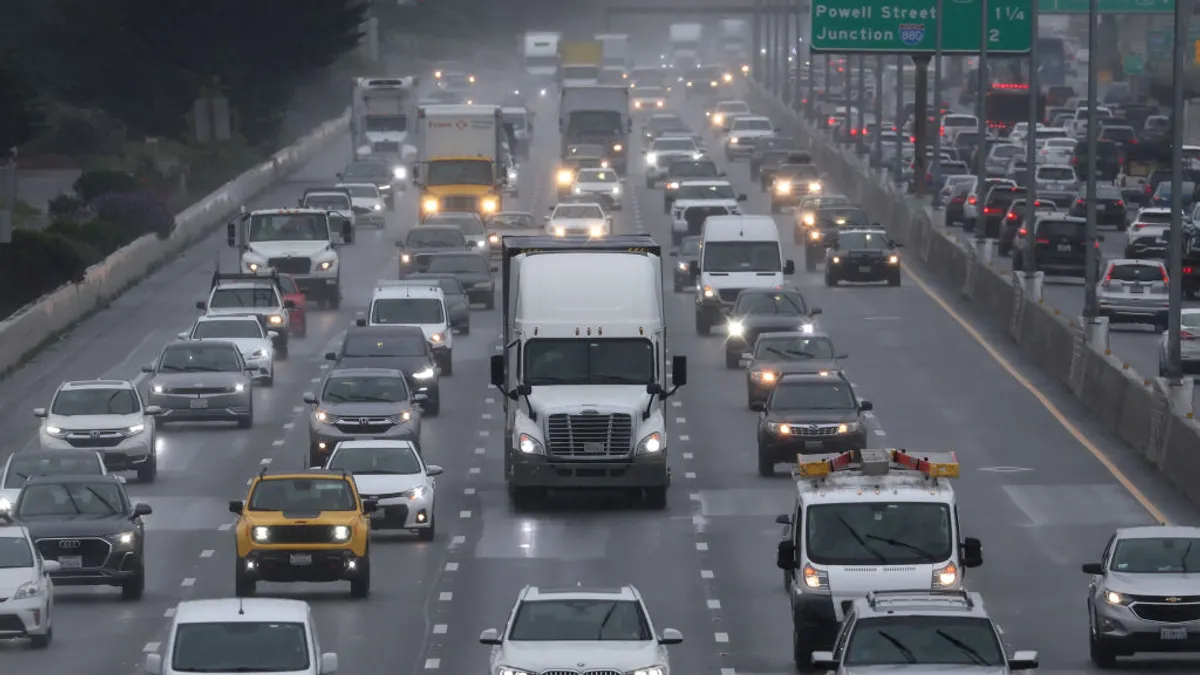The FMCSA asked the public in August to comment on an idea: allowing drivers one off-duty break of at least 30 minutes, and no more than three hours, that would pause the 14-hour driving window.
This concept was almost part of the HOS final rule. But when the updates became official Sept. 29, the pause was missing, and public comments against it were the determining factor, according to the agency.
When the FCMSA resurfaced the idea, it was in the form of a Split Duty Period Pilot Program. Drivers would still need to take 10 consecutive hours off duty at the end of a shift.
So far, the FMCSA has received about 200 public comments, ranging from steadfast support to outright opposition and everything in between. Here’s a look at some of those comments. (Commenters have the option of attaching a name or being anonymous. Some comments have been edited slightly for grammar and/or length.)
Pausing the window would alleviate driver stress
“The inability to pause the 14 hour clock places unnecessary stress on drivers and causes them to feel rushed.”

Ricky Johnson
Ricky Johnson: “The inability to pause the 14 hour clock places unnecessary stress on drivers and causes them to feel rushed. It makes no sense to me to not give drivers the ability to take a break during their day that does not cause them to feel rushed later because of the constantly ticking clock.”
Kent Leitner: “Wow would this be beneficial in many ways. Not just the flexibility side for operators of the equipment. But I think the safety side would also benefit with this option. Operators would not have to drive so fast and hopefully some of the road courtesy will return. I am a driver with 4 million accident free miles, 34 years of over the road driving experience and have witnessed firsthand the increase in risk that has happened since everyone is required to work with these tight schedules everyday, made even worse with the way we have to push ourselves. I call this ‘deadline trucking.’ And how true it is sometimes with our schedules and peoples lives.”
Kathy Vens: “Yes! Yes! Yes!! This is a step in the right direction. Though, the 14[-hour window] should pause any time we stop — if its 10 minutes or 5 hours. By allowing us to pause the 14, it allows us the ability to stop as needed (for restroom breaks, get up and walk around breaks, need a power nap break) without costing us log time or money in our paychecks.”
Pausing the clock would help prevent fatigue ...
“It would allow us older folks to take a nap and not force us to drive drowsy, trying to make up time lost from breakdown or time lost at a dock.”

Dave Mott
Henry Beck: “Been asking for this for years. It allows a driver to refresh oneself when needed; park when encountering heavy volume of traffic or severe weather without penalty of lost time. No need to push too hard to make distance against a clock ... Allowing a driver to take their break, get a meal and have the time to enjoy it, get a shower and possibly a nap before returning to on duty, makes for a more content and safer driver.”
Jose Gonzalez: “I think the idea is a great idea. We, as professional truck drivers, should have the right to pause the clock so we can get rest, eat shop etc and not be penalized by our company or [the Department of Transportation]. I believe once you do this, you give the drivers more of a chance to have a normal day-to-day life, with less fatigue and also a better attitude toward the job, which, in turn will stop the high driver turn over rate. I think it’s time to give us more of a voice on how to run our day to day operations. We are ultimately sacrificing a lot of things in order to keep America moving. I think this will allow the driver to enjoy the job instead of racing against time.”
Dave Mott: “I am all for the break. It would allow us older folks to take a nap and not force us to drive drowsy, trying to make up time lost from breakdown or time lost at a dock.”
Joe Odom: “I’m a 25-year trucking veteran and I’m still an owner operator today. I feel that giving a split break is better, because after driving a truck for 11 hours with only a 30-minute break is too hard on anyone that [drives] for a living. If you could still take a break like we did back in the ole days, where we could drive 5 sleeper 4 and so forth, us drivers would be a lot lest fatigued and able to function better ... We are not getting the relief that we need to function correctly. If we were able to split our drive time with sleeper time, you would see less fatigue in drivers.”
Terry Waugh: “As an [over-the-road] truck driver, I believe this could potentially help with two facets of the industry. First, by allowing drivers to pause the 14 hour clock, it allows drivers to follow circadian sleep rhythms on the the human body and allow drivers to stop and take naps as need during periods of fatigue, usually during the hours of 4 a.m.-6 a.m. and 3 p.m.-6 p.m. Second, by allowing the pause, it could allow drivers to stop during peak traffic periods, thus reducing trucks in congested areas, then allow them to move more freely once traffic has cleared, reducing large trucks in traffic flow during these peak periods of congestion.”
Timothy White: “I think it would be an effective tool for extended wait times at shippers and receivers, and/or just needing a midday rest break. I think it would allow drivers more freedom to make a living and be more rested. I think rest would be the biggest benefit, if you took a midday two hour sleeper berth time then extend the 14 hour Rule. But limit it to strictly sleeper berth.”
... Or it could exacerbate driver fatigue
“I am against this proposal, as it will promote cheating by drivers and trucking companies and keep tired drivers on the road.”

John Bowlby
John Bowlby: “I am against this proposal, as it will promote cheating by drivers and trucking companies and keep tired drivers on the road. Imagine how many drivers who are stuck waiting to load or unload at a customer for many hours, and, instead of showing on duty, they will show a short amount of time and then change over to off duty to save time. Many drivers are doing this even under current hour of service rules ... Don’t pass this rule giving drivers and trucking companies another way to cheat. Instead, come up with rules that get the drivers paid for all of their time at the customers so they have no reason to cheat to make up for the time they are not being paid.”
Barb Conley: “Extensive sleep studies were conducted and researched to come up with the 14-hour clock in the first place. Adding a potential three additional hours to the 14-hour clock would go directly against the sleep research and studies already done to create it in the first place. Strongly not advised.”
Pausing the driving window would account for wait times outside the driver’s control
“This would remove a lot of anxiety of the ‘I gotta go’ out of play — sitting at a dock waiting to unload and they take their sweet time while your clock is ticking. ”

Laura Wade
Tracey Bodrey: “As a driver, I think that this is greatly needed. There are times that it is out of the drivers hands to finish his delivery. I drive a pneumatic tanker, and sometimes I’ll arrive at someplace and have two or three trucks ahead of me. It takes 1.5-2 hours, sometimes longer, to pump out so I can sit for anywhere to 2-6 hours waiting to deliver my load. I usually crawl in the sleeper and take a nap. With this, I would at least have some of my time to continue on to my next destination instead of running out of time because I had to wait on those trucks ahead of me. It also allows for drivers who are tired to stop and take the nap they need to finish the rest of their trip without cutting into their work day.”
Bob Eli: “In my opinion, this could increase safety on the road for everyone. With the amount of road construction happening all across America, and the volume of traffic both commercial and pleasure, this would allow the commercial driver the option to stop if [he or she] needed to rest after spending unplanned time stuck in very slow or stop and go traffic. This type of situation is very stressful, when faced with an already-restricted work schedule and could lead to a driver using poor judgment when subjected to these situations. The ability to pause the 14-hour clock and pull over and decompress would result in a fresh and rested, less-agitated driver.
David Gonzales: “That would help tremendously, because shippers, receivers, roadside truck repairs, traffic accidents take a large part of your 14-hour clock, which, as drivers, you have no control over. Then you have to cut corners an other dangerous actives to try to recoup some of the time you lost because of no fault of your own.”
Laura Wade: “This would remove a lot of anxiety of the ‘I gotta go’ out of play — sitting at a dock waiting to unload and they take their sweet time while your clock is ticking. The brokers, shippers and receivers will never understand our timeline to get the freight moved, and, with this pause, we would have some leeway on still having time and not in violation. Also a great help would be in weather. This window would give a driver time to find a safe place to holdover while the road crews are trying to clear roads that happened after your day started.”
The rule could be used unfairly against drivers
“I’m concerned that every company driver (which there are more company drivers than owner-operators) will absolutely be coerced to drive unsafe, tired and cause more problems than it’s worth.”

Charli Ardoin
Anonymous Anonymous: “My first concern is that a ‘pause’ is a violation of HOS limitations of safe human driving endurance. My second concern is that it will be used by carriers to pressure their drivers to use the ‘pause’ for scheduling considerations convenient to the carrier, not the driver. Only an owner-operator who isn’t leased to anyone might be able to make the decision to ‘pause’ in an independent frame of mind, but he still can’t ‘choose’ to drive as alert beyond the well-established 14-hour mark for having safe reaction times.”
Charli Ardoin: “I’m concerned that every company driver (which there are more company drivers than owner-operators) will absolutely be coerced to drive unsafe, tired and cause more problems than it’s worth. I see SOOO many new drivers making the most insane mistakes already — now add exhaustion and it’s a cocktail for disaster. Now if the driver is somehow guaranteed protection from coercion, then it would certainly help in some instances.”
CLARENCE FISHER: “This is exactly what major companies want. Pause driver clock with no pay, while holding them up for many hours at the dock. Then tell them to leave the property immediately after load/unload. Is it smart to effectively extend a driver’s day to 17 hours? There are many things wrong with this idea. In fact, this idea attempts to look away at the primary cause of tired drivers. Huge wait times at docks, shippers or receivers, mostly unpaid or paid at the lowest income levels.”
Stephanie Z.: “I’ve been driving for 14 years. I’ve never had fatigue because of the 14-hour clock. In my opinion, carriers will abuse this rule with company drivers. I think with training, companies definitely stay with the 14. It’s simple and keeps the carriers planners and dispatchers in check. Maybe this rule would be ideal for owner-operators or could be used for winter conditions.”
The rule is good, but it needs some tweaks
“I agree with the pause, but think it should be extended up to five hours.”

Rick Sargent
Rick Sargent: “I agree with the pause, but think it should be extended up to five hours. That way, drivers can take a pause around rush hour if they choose and if they encounter adverse conditions (accidents, weather) that would be over by the five-hour mark. Also, [drivers] either need to be able to pause time waiting at docks, or [the FMCSA needs to] mandate maximum limit of two hours at shipper receivers. With limited parking near many locations, what does a driver do if they’re held up until their hours are up? ... So, where do these drivers go? That pause could allow them to make it to a safe location that has parking available.”
Conard Transportation, Inc: “The one main change we were excited about [was] the ability to pause the 14-hour clock. However, it has not worked like anticipated. Unfortunately you cannot use this unless, at the end of your shift, you go into the sleeper berth. This does not work for our operations ... Can we please get added to the rule to include OFF DUTY status along with Sleeper Berth to be able to utilize this rule? Why in the world would the rule be stated this way?”




















